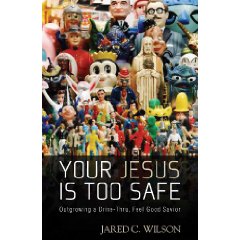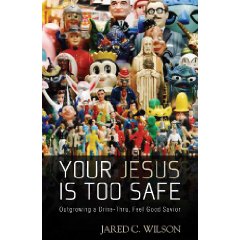
Jesus is the most significant person in history and the number of versions of him is fascinating. Sometimes Jesus is pictured as the enlightened sage who says lofty but generic spirituals things. Or he is your moral teacher who gives us helpful principles to live by and makes us nicer and more successful. And sometimes we are told he is our sweet friend who just wants to affirm you for being you.
Our temptation seems to be that we create a Jesus out of our own wishes and then we worship him, which sounds a bit narcissistic and creepy, doesn’t it? People want to tame and domesticate Jesus to make him more safe.That’s why my friend Jared Wilson wrote his book, Your Jesus is Too Safe: Outgrowing a Drive-Thru, Feel Good Savior. This book is winsome, insightful, and packed with the good news from and about Jesus. Your Jesus is Too Safe sets up the problem of myriad Jesuses throughout church and cultural history, each made in our own images and reflective of our own prejudices, preferences, and sins.
The book reads like a great blend of Paul Zahl’s The First Christian and Stephen Prothero’s American Jesus. Wilson’s aim is to provide a fresh look at “the historical Jesus” but in a tone and context more pastoral than academic, but he doesn’t leave the academic behind.

Each chapter takes a particular angle on Jesus—promise, sacrifice, shepherd, prophet, judge, redeemer, savior, Lord, forgiver, king, provision—and then focuses on “the unsearchable riches of Christ” for impoverished sinners.
In addition to lots of humor in the book, personal stories abound, as well as commentary on news items like church and school shootings and oddities like the guy in Miami who claims to be Jesus. While there are scattered indictments of gospel-deficient churches, the book is a positive declaration of Jesus Christ’s grace and goodness.
Here are some of my favorite quotes:
“Not only does he identify himself as the Good Shepherd who sacrifices himself for the sheep, he places himself in the role of sacrificial lamb. In John 10 he may be calling himself the Good Shepherd, but nine chapters previous, John the Baptist is calling him the Lamb of God. He is both the shepherd and the sheep. That’s how far Jesus was willing to go to save us. That’s how far he’s willing to go to identify with us” (112-113).
“We have a Shepherd who relentlessly chases after us. We have a Shepherd who is constantly on the lookout for his lost sheep. This is the kind of Shepherd who will prioritize the lost one ahead of the secured one” (117).
“A resurrection gospel is a full gospel. What we are accustomed to is a simplistic, stripped down gospel, a gospel that suggests, ‘You have issues, but Jesus died for you; now be a good person.’ The full gospel says, ‘The problem is a radical one no less serious than death and it requires a radical intervention no less powerful than resurrection’” (271).
“We are saved from many things: sin, Satan, punishment, death. But primarily we are saved from the wrath of God. And we aren’t just passed over for wrath; we are brought in, held close, covered up. We have received reconciliation. This is such a powerful way to talk about salvation, because it moves us beyond self-centered talk of being saved into a personal faith, as if Christianity is about self-improvement, and takes us right into being unified again with God, which posits salvation such as it is—Jesus the Savior taking dead strangers to God and transforming them into living friends” (274).

COMMENTS
Leave a Reply














